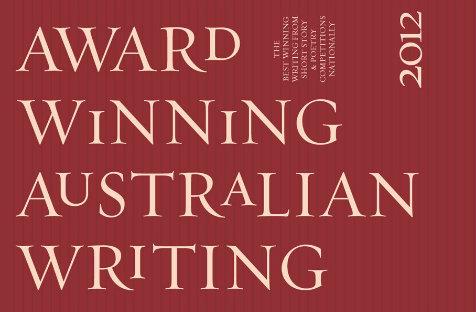Award Winning Australian Writing 2012 is the fifth such anthology published by Melbourne Books. Edited by Adolfo Aranjuez, the anthology is important not only for its content – winning works from short story and poetry competitions nationally, as per the book’s subtitle – but as a representation of the writing our judges consider exemplary.
Introducing the collection, the foreword by Mark Tredinnick, who won the Montreal Prize last year, reads effortlessly and recalls Jim Harrison’s words: ‘We are here to be curious, not consoled. The gift of the gods is consciousness.’
As Tredinnick writes: ‘Literature – reading it, making it, sharing it, prizing it – is a way, probably an indispensible way, of cultivating consciousness, that gift of the gods, and of practising curiosity.’
And herein lies the beauty of the anthology, of collecting award winning Australian writing; it exists not only to cultivate consciousness but ‘…to perpetuate and recharge the conversation literature carries on – about who we are, and what is real, and what counts, and what one can do to help’.
Matt Young’s ‘Vanadis’ (Express Media Awards – Best Fiction Piece) is a dark, nightmarish tale about a dad who sneaks ciggies in the empty chicken shed out back. He works at a Cintec plant, ‘making sulphuric acid used in the production of fertiliser, and he would come home with hands stained yellow like brass’. This is a story of chemicals and decay, of modernity. Young’s writing is confident and sparse and the ending punched me in the gut.
Rafael S.W.’s ‘The summer they were fragile’ (winner of the Ada Cambridge Poetry Prize) is a mature, rolling thing that seems like a photograph – or the snapshots of summer – found under your doorstep, delivered by someone you don’t know. This is controlled chaos, the modern nightmare, delivered one sentence at a time.
Reminding us of beauty and of love, David Blissett’s ‘A Man. His Girl. That Tent.’ is one of the most powerful in the collection. Winning the FAW North Shore Short Story Competition, Blissett’s command of language, and indeed his restraint, takes the reader out of the city to a forest clearing, to a place where ‘Everything is white. Frozen teardrops hang in still life. The grass is thick and furry. Rays of gold cut in between the ash trunks, setting fire to the undergrowth.’ This story is a refuge, a place to hide, to exist with someone. ‘For what is tomorrow when a man has his life, his girl and that tent.’
Somewhat continuing the thread, Brooke Davis’s ‘Karl the Touch Typist’ (QUT Creative Writing Prize) grabs you by the throat and chokes you up. The story jumps between past and present, telling the life of Karl, from a young boy to an old man, and the ending, while predictable, satisfies.
Belinda Miller’s ‘A Love Song’ (ANU Short Story Competition) is genius. Different epitaphs, all positive and loving, are offset by stark, honest accounts of people’s lives, told from the perspective of friends of loved ones. A very talented writer.
Joel Ephraim’s ‘Rock Candy’, which won Overland’s Judith Wright Poetry Prize for New and Emerging Poets is another exploration of modernity. Particularly enjoyable is the intelligent way the poet plays with the meanings of words: ‘a blonde bombshell/found mostly in the rain’, and, ‘I try to hide/my hard-on, we shouldn’t be so hard/ on ourselves’.
There are other notable highlights. Tully Hansen’s ‘Grey Throughs in Break Rooms’, is an clever, speculative piece about postmodernism and the future. Having read this author before, Hansen’s writing is identifiable and unique. He is an author to watch. I also liked Jack Nicholls’ ‘The Statues of Melbourne’, not only because it reminded me of a Doctor Who narrative but also due to the believability of the story and the simplicity of the text.
Occasionally, some of the anthology’s content feels tired. Marnie Walters-Burgess’ ‘The Squatter’ (Bendigo Literary Awards) seems forced and awkward. There is a lack of believability – why is the protagonist walking into a squat? Why is the junkie getting away with eating people all the time? Why is the junkie hungry all the time if he is a junkie? – which reduces the story’s impact, making it feel fake. Kerri Harris’ ‘Why Don’t Elephants Smoke?’ (Grenfell Henry Lawson Festival of the Arts Literary Competition), despite its fairly obvious message, feels righteous and elementary. While the author succeeds in telling us that smoking kills, she fails in narrating anything new, though perhaps, this was the author’s intention.
By and large, there is a magic to this compilation. The reader comes away feeling excited, inspired even, and Tredinnick’s words seem to return with more weight. We should ‘Write, as the writers in this anthology have done, to make beauty, to make sense, to make prayer, to make love … to perpetuate and recharge the conversation literature carries on’.
The Award Winning Australian Writing 2012 anthology proves that there are writers in this country pushing boundaries and exploring literature in modern ways, which is something that deserves celebration.
Rating: 4 stars out of 5
Award Winning Australian Writing 2012
Edited by Adolfo Aranjuez
Paperback, 336pp, RRP $29.95
Melbourne Books
Melbourne launch: City Library, Thursday 22 November from 5.30pm





